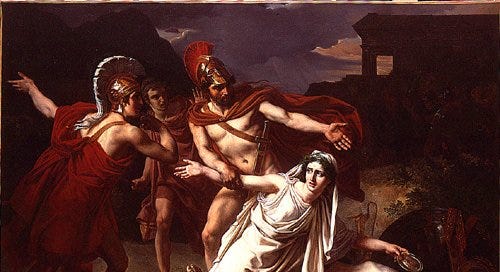Fixing the Problems of Portraying Sophocles' Antigone
How to frame the Greek play for a modern audience without sacrificing its meaning.
Statistics show that the average American is less involved with organized faith than he was a century ago. Newer generations have adopted the slogan “spiritual but not religious” as a boilerplate response to affirm their belief in a higher power while justifying their absence from church. The gods are major characters in almost all Greek plays and, as time has progressed, the messages that playwrights intended to convey have become diluted.
Without checking, I’d guess that Sophocles’ Antigone has been the most frequently staged Greek play since the rise of the Catholic church. The message of acting on faith to a just God without their direct interference in events works well with the tenets of Christianity.1 On the other hand, the idea of acting against the state looks crazy to us because we differ in values from the Greeks. Some of this can benefit a production: Jean Anouilh’s famous adaptation was permitted in Vichy France for the sole reason that the Nazis interpreted the message as anti-resistance. It would be a shame if younger audiences made a similar mistake, which is why we ought to find a way to frame the events differently.
Make it about libraries
The biggest fight against tyrannical government in modern-day America is the removal of books that acknowledge the existence of gay people from libraries.2 Every year, the world celebrates Banned Books Week to emphasize the importance of free speech and promote an understanding of what information tyrannical governments consider dangerous. I remember the displays my local library presented for us in my childhood, and what better place to frame our play than here? Our stand-in for Creon can be a Ron DeSantis-type mayor, and Antigone can be a passionate librarian who won’t stop putting the banned book (obviously written by Polynices) on display. Americans tend not to enjoy pure tragedies, so it would behoove the author to have that tyrannical mayor violate as many of the librarian’s constitutional rights as possible before sentencing her to death. The first, fourth, and eighth amendments ought to be easy to write in, but going for all 10 amendments would be quite a feat. Frankly, part of the humor is shoehorning in an over-the-top way to violate the third or tenth amendment to make it explicitly clear to the audience how anti-American the whole situation is. I don’t really know how a Haemon-style character would work into the plot as it has been laid out, but there may be enough material here that he can be omitted.
Keep reading with a 7-day free trial
Subscribe to Nusky’s Classics Corner to keep reading this post and get 7 days of free access to the full post archives.




